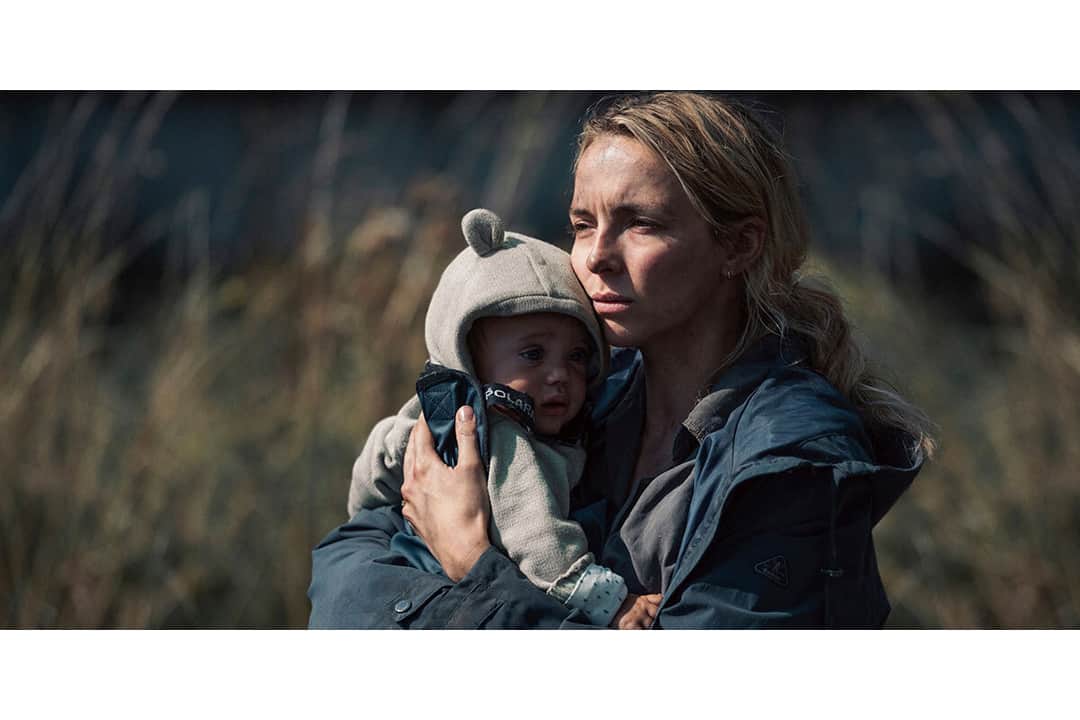The End We Start From envisions a near future where the next generation of people must navigate the climate crisis’ acute effects. The film follows the story of a new mother’s experience protecting her child from climate disaster and the social ramifications that ensue.
Based on a novel by Megan Hunter, the film begins in the present day with a nameless mother named the Woman, played by Jodie Comer, giving birth to her first child amid a catastrophic storm. As severe flooding ravages the streets of London, she is forced to flee northward with her baby and husband, played by Joel Fry.
The new family seeks shelter from the weather at the husband’s childhood home, but it is not long until food insecurity threatens the family unit, leaving the mother at home while her husband and in-laws seek food. Her in-laws end up dying tragically as a result of the scramble to find supplies. As the lack of food pushes them out of the home, the new mother and baby find themselves at a shelter where they must leave the husband behind to gain access.
At the shelter, Comer’s character bonds with another new mother named “O”, played by Katherine Waterston. The two parents go to a commune, where they are asked to forget the past and adopt a new, sustainable way of life. Despite the benefits of community, nourishment, and shelter the commune offers, the mother is haunted by her decision to leave her husband behind. She journeys back to London on her own to reconnect with her family.
As a whole, the film’s narrative explores the protagonist’s struggle to protect her child, highlighting the realities of homelessness, food insecurity, fear, and grief as symptoms of the climate crisis. Each character experiences the same catastrophic flooding and storm; however, due to their unique identities and perspectives, their responses to the challenges vary.
It was an artistic choice not to attribute real names to each character, and I can see how it draws the viewer in, allowing them to see themself in each character’s place. However, it also achieves the opposite effect. By withholding names, their storylines become more generalized, making it harder for the viewer to empathize with each individual.
This film also moves slowly, with large gaps between intense action and little to no insights into the character’s true emotions. Its emotional side relies on the actors’ performances. Jodie Comer proves herself to be a skilled actress in this film, and her performance is very powerful, conveying everything from the rare bits of joy in her character’s day to unfathomable devastation.
Considering its broader message, the juxtaposition between bringing a new life into the world as the world seems to be ending highlights our collective fears for future generations. While the parents have had a chance to live in the relatively normal past, their child cannot reference the ‘old normal.’ The new generation will have to deal with the catastrophic consequences of our past generations’ actions.
This being said, the film’s message also falls short as a piece of environmental fiction due to its Eurocentrism. Severe climate change-related disasters are a current and deadly concern in countries and communities surrounding the equator. The film makes no effort to employ lived experiences from these areas or even reference non-European knowledge regarding crisis management.
Throughout the film, we are shown beautiful yet tumultuous natural landscapes woven between the film’s events. Each character is called back to the earth and learns how to live with nature, rather than within the binary of the ‘indoors’ and ‘outdoors’. The film does a good job of portraying life in Europe after a climate disaster from the new mother’s perspective.
However, I find that the film’s ending fumbles the bag by having the family of three reunite in their initial home, returning to their sense of normalcy. This ending suggests the characters can just move on and maintain the sense of a past life even though their past lifestyle caused their climate problems. The notion of a lasting reconnection with the environment for these characters is weak at best.
Unfortunately, the audience often has to suspend their disbelief for moments that the filmmakers skimmed over when they would have benefited from greater detail. At the beginning of the film, Joel Fry’s character comments on their London home being gone, when at the end, they all reunite in the kitchen of the same home. Furthermore, the mother’s adjustment to living off the land happens overnight. The transition from living in a consumer society to being forced to forage could have been interesting to explore, but this was neglected. Additionally, despite driving for hours, navigating tragedy, and even stealing a car, the main character never seems to run out of gas.
Despite these flaws, the film’s messages about new generations inheriting a damaged earth and humanity’s need for connection amid adversity shines through. The film ends with the family of three reunited and celebrating what appears to be the child’s first steps. The end signals the first steps to a better future and the presence of hope for the next and current generations.



No comments to display.